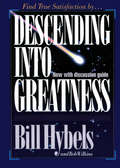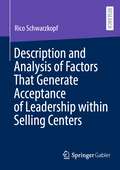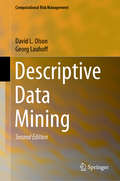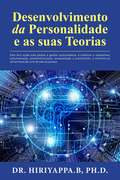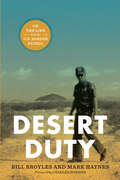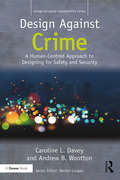- Table View
- List View
Desarrolle los líderes que están alrededor de usted
by John C. MaxwellLa mayor inversión en el mundo actual no es la más reciente y más grande compañía de la lista de Fortune 500, es la gente. Su sendero para lograr el éxito, al igual que el de su equipo, será determinado por la medida de eficacia en que esas personas son capacitadas y desarrolladas como líderes. Con Desarrolle los líderes que están alrededor de usted, John C. Maxwell le ayudará a identificar los líderes en potencia, a capacitarlos y a convertirse en su mentor. Si usted tiene personas alrededor suyo que desea desarrollar para que sean líderes o si usted ya dirige un grupo de líderes, esta capacitación es algo que usted no puede perderse. John le ayudará a: Identificar, capacitar y ser mentor de líderes dentro y fuera de su organización Comprender por qué la reproducción de liderazgo es esencial para el éxitoAprender a destacar las cualidades de liderazgo en los que están a su alrededor Dominar el proceso de cinco pasos para convertir productores en reproductores Crear una cultura de liderazgo en su organización que apoye el crecimiento Unificar la mezcla correcta de líderes en su equipo Discernir e incrementar los niveles de influencia ¡Y mucho más!
Desarrolle mujeres líderes: Esquive los obstáculos y libere el potencial de las mujeres en su iglesia.
by Kadi ColeCómo aprovechar más eficazmente los dones y las capacidades de liderazgo de las mujeres en tu iglesia¿Cómo sería tu iglesia en el futuro si maximizaras los dones latentes de las mujeres que Dios ha puesto allí? En Desarrolle mujeres líderes, Kadi Cole, veterana de treinta años en liderazgo y desarrollo de personas, ofrece una estrategia práctica para ayudar a los líderes de iglesias y organizaciones a crear culturas que faciliten el desarrollo de mujeres como voluntarias y líderes del personal.Mediante el uso de entrevistas y encuestas de más de mil mujeres en roles clave de la iglesia y la organización, combinadas con investigación actual, la autora ha creado ocho «prácticas óptimas» fáciles de implementar que ayudan a acelerar la contribución organizacional de una mujer.Los apéndices y referencias amplias agregan aún más orientación para establecer visión, hitos y metas. Desarrolle mujeres líderes es un recurso único en su género para identificar lo que carece hoy en su iglesia para ayudarla a prosperar en el futuro.
Desarrollo de las Habilidades de Liderazgo
by Hiriyappa B Yasmin Nicol Quintanilla PereiraDesarrollo de las Habilidades de Liderazgo Este texto apoya a los estudiantes en el desarrollo de las habilidades de liderazgo y la aplicación efectiva del manejo de las funciones de liderazgo en los negocios y en su vida. De esta manera se entrega a los aprendices un claro recorrido a travez del desarrollo de las habilidades de liderazgo y enseñanzas para ver cual es actualmente su posición y forma para planificar el desarrollo de fortalezas en grandes habilidades de liderazgo. Este libro muestra un cultivo eficaz de las habilidades de liderazgo y ayuda a mejorar ls puntos de funciones de liderazgo, asi como debes ser para transformarte en un líder. .
Desarrollo: Una visión innovadora
by Gerónimo Frigerio¿Por qué el desarrollo es el futuro de América Latina? Porque supone pasar de la pobreza a la generación de riqueza, de la informalidad a la formalidad y de una realidad de desempleo a una de creación de trabajo. Gerónimo Frigerio explica cómo en un libro realista y esperanzador. La ambición de este libro es servir de inspiración a hombres y mujeres de América Latina para que nos convirtamos en actores del desarrollo y, por lo tanto, en protagonistas de un futuro mejor en nuestros países y en la región. El proceso de desarrollo no solo implica pasar del estancamiento al crecimiento, de la pobreza a la generación de riqueza, de la informalidad a la formalidad, o de una realidad de desempleo a una de creación de trabajo; supone también convertir las trabas en oportunidades, la parálisis en acción, el desánimo en esperanza. Con la claridad y contundencia con que lo hizo en Simple. Una idea para transformar el futuro de América Latina, Gerónimo Frigerio combina visión individual, nacional y regional en un marco de reflexión realista, práctico y constructivo, y presenta un mensaje optimista: América Latina puede dejar de ser un conjunto de países sin rumbo para transformarse en un conjunto de sociedades que planifican su futuro.
Descending Into Greatness
by Bill Hybels Rob WilkinsIn a society where "upward mobility" is the highest goal, Bill Hybels asks a tough question: Do Christians place God's desires first-or their own? In Descending into Greatness, Hybels and writer Rob Wilkins take the example of Christ's downward journey as it was meant to be; the radical and essential answer for every Christian. In fourteen powerful chapters, the authors explore such topics as How Jesus managed power. The intentional decisions necessary to move down. The uplifting nature of true humility. Abundant life through dying to self. The ambush of joy. Moving down is never an easy matter that can be reduced to a formula. It involves a life committed to discipleship. Descending into Greatness introduces you to the touching stories of modern men and women committed to advancing the kingdom of God: from the pro football player, to the medical missionary, to a businessman wrestling with the priorities in the world of finance. Descending into Greatness asks tough questions and gives hopeful answers. Now, this powerful, urgent message also includes a discussion guide so that you can follow through, too. "Like Christ, we must descend-into self-abandonment, unconditional giving, sacrifice, and death to self. And, like Christ, we will then ascend-into fulfillment, blessing, joy, and purpose."
Deschooling L�earning
by Michael Singh Bobby HarreveldDeschooling L'earning explores how recent reforms to young adults' senior secondary schooling have given rise to capital friendly learning-and-earning (l'earning) webs, reporting how leaders committed to deschooling have mobilised capability brokers to create l'earning networks. Illich's ideas are used to explain disenchantment with disengaging schooling, and neo-Weberian conceptions of the new spirit of capitalism are employed to deepen understanding of these reforms. Singh and Harreveld's analysis uses the idea of deschooling l'earning to ask whether these reforms build young adults' commitment to twenty-first-century modes of capital accumulation? Deschooling L'earning also gives insights into questions teacher education might ask about securing the future life/work trajectories of young adults, reassuring them that these reforms can serve the common good. These conceptual resources provide tools for corrective and transformative critiques that test government policies and practices for their adverse effects.
Descifrar el futuro: La economía Colombiana de la proxima decada
by FedesarrolloUn libro que llega en el mejor momento, cuando la recuperación económica se convierte en un tema central del debate público. Para conmemorar sus cincuenta años, Fedesarrollo reunió a algunos de los mejores investigadores de la entidad en un solo libro. El objetivo: lograr el diagnóstico más completo de la economía colombiana del presente y hacer proyecciones para los próximos diez años. Crecimiento, demografía, pobreza, empleo, educación, infraestructura, energía, sostenibilidad e instituciones son los nueve capítulos que componen este análisis de largo alcance.
Descolonizando la riqueza
by Edgar VillanuevaLa verdad ineludible es que el racismo sistémico y las estructuras coloniales son principios fundamentales de nuestras economías.Nuestra industria filantrópica de mil millones de dólares es un ejemplo flagrante. ¿Cómo, pues, cambiamos la filantropía y otras industrias hacia la reconciliación social y la sanación si sus premisas básicas son la explotación, la extracción y el control? En Descolonizar la riqueza, Edgar Villanueva mira más allá de la glamurosa y altruista fachada de la filantropía y nos introduce en sus sombras: supremacía blanca, complejo de salvador y opresión interiorizada. Después, basándose en tradiciones nativas, Edgar empodera a individuos e instituciones para comenzar a reparar los daños mediante sus siete pasos para la sanación. En esta segunda edición, añade inspiradores ejemplos de personas que utilizan sus recursos para descolonizar el sector del entretenimiento, museos, bibliotecas, la propiedad de tierras y mucho más. Todos podemos ser personas y líderes sanadores para restaurar el equilibrio, y todos tenemos que hacer nuestra parte. ¿Estás dispuesto?
Describing Construction: Industries, Projects and Firms
by Rick Best Jim MeikleThis third book from editors Rick Best and Jim Meikle brings together and presents insights into a number of key concepts in the study of construction firms, projects and the group of activities that loosely define the construction industry. The value for readers comes from the collection of a variety of topics in a single volume, which provide a basic understanding of the complexities of construction as more than a set of practical concerns such as labour management and materials handling. Instead, the focus is on analysis of the industry and its component parts from the viewpoints of construction economists and others seeking to understand the drivers and challenges that shape an area of economic activity that is a major contributor in all economies. The aim of this book is to provide an overview and discussion of several aspects of what makes construction tick. It is unlike other industry sectors in many ways, being project-based with often intense competition for work. Where the first book, Measuring Construction, focused on particular areas associated with quantifying various aspects of construction activity and the second, Accounting for Construction, looked more at how we record and report on construction activity, Describing Construction gives readers the views of experts in the field of how the construction industry is described, what its make-up is, it even asks the question: is construction a single industry? This book will change the way most readers understand the ‘construction industry’, whatever that may be, not from the point of view of visible on-site activities, but through a scientific approach to analysis and understanding of how projects, firms and various sectors of the industry work and how things are changing and may continue to change in future. It is essential reading for students and researchers in construction management, quantity surveying, architecture and engineering.
Description and Analysis of Factors That Generate Acceptance of Leadership within Selling Centers
by Rico SchwarzkopfSales processes in the business customer segment are increasingly taking place on a multi-person level. In order to ensure that technical experts and decision-makers can be adequately deployed in the selling center, sales associates usually carry out leadership tasks. The leadership of the selling center participants plays a crucial role when it comes to acting in a coordinated and professional manner towards the customer. However, this presupposes that a sales associate is accepted in the leadership role by all participants involved. This book examines the factors that generate acceptance of leadership within selling centers in order to enable and positively influence the cooperation of the selling center team.
Descriptive Data Mining (Computational Risk Management)
by David L. Olson Georg LauhoffThis book provides an overview of data mining methods demonstrated by software. Knowledge management involves application of human knowledge (epistemology) with the technological advances of our current society (computer systems) and big data, both in terms of collecting data and in analyzing it. We see three types of analytic tools. Descriptive analytics focus on reports of what has happened. Predictive analytics extend statistical and/or artificial intelligence to provide forecasting capability. It also includes classification modeling. Diagnostic analytics can apply analysis to sensor input to direct control systems automatically. Prescriptive analytics applies quantitative models to optimize systems, or at least to identify improved systems. Data mining includes descriptive and predictive modeling. Operations research includes all three. This book focuses on descriptive analytics.The book seeks to provide simple explanations and demonstration of some descriptive tools. This second edition provides more examples of big data impact, updates the content on visualization, clarifies some points, and expands coverage of association rules and cluster analysis. Chapter 1 gives an overview in the context of knowledge management. Chapter 2 discusses some basic software support to data visualization. Chapter 3 covers fundamentals of market basket analysis, and Chapter 4 provides demonstration of RFM modeling, a basic marketing data mining tool. Chapter 5 demonstrates association rule mining. Chapter 6 is a more in-depth coverage of cluster analysis. Chapter 7 discusses link analysis. Models are demonstrated using business related data. The style of the book is intended to be descriptive, seeking to explain how methods work, with some citations, but without deep scholarly reference. The data sets and software are all selected for widespread availability and access by any reader with computer links.
Descubra A Sua Marca: um livro para os escritores criarem a sua marca
by Emlyn Chand Gabriel Martimiano PiresDescubra a Sua Marca: um livro para os escritores criarem a sua marca Descubra a sua marca e como comunicar isso aos leitores com conselhos testados que você pode colocar em prática hoje. Está com dificuldade para resumir tudo que representa o que você escreve em um pacote organizado, arrumado e de fácil explicação? Talvez esteja tentando imaginar o que a marca significa quando aplicada a uma pessoa, talvez já tenha diluído tanto a sua marca que os leitores não têm ideia do que esperar quando eles pegam um dos seus livros. Descubra a Sua Marca está aqui para lhe ajudar! Em algumas horas, você vai descobrir um caminho bem novo para o que você escreve e adicionar mais certeza à sua jornada existente, você vai aprender como os seus leitores ideais enxergam, pensam e como animar esses leitores. Com esse guia, você vai... · Participar de exercícios guiados para criar a marca · Juntar Ideias & pegar emprestado 8 ideias para histórias · Como é o seu leitor ideal · Determinar se precisa de pseudônimo · Saber quais as regras de marketing ou escrita que pode quebrar às vezes · Descobrir o seu gênero (usando esse estilo: "escolha a sua aventura") · Defina a sua marca em 3 palavras · Cria uma biografia de escritor e um slogan · Faça um plano com interesses e habilidades · Baixe 5 brindes exclusivos para leitores desse livro Esse livro foi finalista na categoria de não ficção nas premiações Eric Hoffer em 2015. A Nossa Garantia: Está cansado de livros para fazer marketing de livros que focam mais na história de vida do escritor do que em conselhos que você pode usar na sua carreira? Ou, pior ainda, guias de conselhos que são direcionados para escrit
Descubre cómo hacerse rico a través del zodiaco
by Andrea Valeria¡J.P. Morgan dijo que los millonarios no usan astrología, pero los billonarios sí! Aquí en estas páginas aprenderás de manera directa, divertida, interesante, anecdótica y a veces muy personal como acercarte a eso que unos llaman la riqueza y otros simplemente su riqueza propia de ser y hacer. Cada uno de nosotros escoge, y hay algo para todos al leer los cómos, los trucos, el efecto Júpiter, la jugada, y hasta una que otra adivinanza signo por signo. Aries, con su capacidad de autoexpresión Tauro, comprendiendo su propio don intuitivo Géminis, al aprender cómo alcanzar proyectos personales Cáncer, cómo cumplir con las exigencias de su ego Leo, saber que su propia creatividad funciona Virgo, se sabrá mucho mas rico al comprender su propio psique. Es decir, cuando sepa que su carácter es lo que "son cuando nadie los vé" Libra, sabiendo balancear y aprovechar su propia circunstancia Escorpión al autovalorarse ... esto lo encontrarás en tu propio capítulo Sagitario, podrá sentir la fuerza de los instantes que le convienen Capricornio, como ver con admiración su propio inconsciente Acuario, cuando veas y sientas cuando y donde el fin justifica los medios...o no Piscis, comprenda que tiene las habilidades de hacer lo que quiera y sentir el poder que hay en dar a la vez que desea para si mismo. Cuando leas este libro debes entender que "si se puede"... "yes I can"... Hoy día aparece y desaparece el dinero, una señora gana la lotería de los 590 millones de dólares, y siete jóvenes logran apoderarse de 45 millones de Euros hakeando ATM´s en 10 horas...y las historias se cuentan o se lloran, pero el EFECTO JÚPITER, siempre está presente cuando de riqueza se habla...y el capitulo de "la jugada" te mostrará lo que hace falta para lograr más...más...y mas...aunque no hay que olvidar que la gula es uno de los siete pecados capitales. Los valores, cuando aprendes a medirtelos, te permitirán afinar tus definiciones y acomodarte en tiempos difíciles. Este libro te enriquecerá, permitiéndote ampliar tus horizontes, porque el arte astrológico ha sido usado por Hipocrates, Alejandro el Grande, Galileo Galilei, La Reina Isabel I, Benjamin Franklin, J.P. Morgan y Andrea Valeria, para sentirse en algún momento inmensamente ricos.
Descubre tu destino con el monje que vendió su Ferrari: Una fábula espiritual
by Robin Sharma¡Aprende cómo conseguir la vida que siempre has soñado tener y transforma definitivamente todas las dimensiones de tu mundo! Éste es el último libro de la serie que protagoniza el famoso monje que vendió su Ferrari, una obra que puede conseguir que mires el mundo con otros ojos. Te enseñará a despertar tu yo más íntimo y te ayudará a lograr una vida más plena y más feliz, así como prosperidad y paz interior. Lo único que tienes que hacer es mirar dentro de ti. Escrito como una fábula, Descubre tu destino con el monje que vendió su Ferrari ofrece nuevos aspectos de la sabiduría de Julian Mantle, el superabogado que cambió su vida de lujo por la paz interior y la felicidad. Una ficción inolvidable y paradójicamente realista, que desvela el verdadero propósito de la vida y muestra cómo liberar todo el potencial del ser, el secreto de la felicidad y la importancia de desbordar los límites para así encontrar el camino de la libertad personal. Una combinación de profundidad y lecciones prácticas que abrirá las puertas de las infinitas posibilidades que la vida depara a todas las personas y que transformarán definitivamente todas las dimensiones de tu mundo. Que te enseñará cómo conseguir la vida que siempre has soñado tener.
Descubre tu marca - Hazlo tú mismo: Un manual de Branding para autores
by Alma Edith Garcia Emlyn ChandDescubre tu marca y cómo comunicarla a los lectores con consejos comprobados que puedes poner en marcha hoy mismo. ¿Te está costando trabajo condensar todo lo que representa tu escritura en un paquete limpio, ordenado y que esté explicado fácilmente? Quizá todavía estés tratando de averiguar qué significa cuando una marca aplica a una persona. O tal vez ya has diluido tanto tu marca que los lectores no tienen idea de qué esperar cuando ven uno de tus libros. ¡Descubre tu marca está aquí para ayudarte! En tan sólo unas horas puedes descubrir un camino completamente nuevo para tu escritura o darle más certeza a tu camino existente. Aprenderás cómo son y cómo piensan tus lectores ideales y cómo hacer que se emocionen. Con esta guía podrás: Participar en un ejercicio guiado de branding Hacer una lluvia de ideas y tomar prestadas ocho Ponerle cara a tu lector ideal Determinar si necesitas un seudónimo Aprender cuáles son las reglas de escritura y comercialización que pueden romperse de vez en cuando Encontrar tu género (¡al estilo de "elige tu propia aventura"!) Definir tu marca en tres palabras Crear una biografía y un lema de autor Establecer un plan para tus intereses y habilidades en evolución Descargar cinco regalos exclusivos para los lectores de este libro Nuestra garantía: ¿Estás cansado de examinar meticulosamente las guías de marketing que se centran más en la experiencia de vida del autor que en consejos que puedas aplicar a tu carrera? ¿O peor aún, de las guías de consejos que en realidad son para autores de no ficción y tienen muy poca información valiosa para novelistas? ¿Qué pasa cuando un libro entero parece ser una mera presentación de los servicios del autor o de otros libros de su serie? Nosotros también estamos hartos de eso. Cada guía de Novel Publicity para escribir y comercializar la ficción se centra en ti. Si eres es un aspirante a novel
Desenredar la Argentina: Diagnósticos y propuestas para quebrar la decadencia
by Luciano LaspinaUna salida a las profundas heridas generadas por el populismo a través de medidas para no repetir los errores que llevaron a la actual decadencia. Diagnóstico de los principales problemas que enfrentará el próximo gobierno y reformas económicas orientadas a resolverlos. «El próximo gobierno asumirá en medio de la crisis terminal de un nuevo experimento populista en la Argentina. Nuestro país tiene una larguísima tradición de populismo político y macroeconómico. La economía argentina está totalmente enredada. Enredada en una maraña de complejas regulaciones, altos impuestos, trabas para importar, impuestos para exportar, insólitas restricciones y costos para crear empleos, desincentivos e inseguridad jurídica para invertir, dificultades crónicas para ahorrar sin ser estafado por la inflación e imposibilidad de obtener créditos a plazos y tasas razonables. Por eso, la economía tropieza con crisis y recesiones desde hace muchas décadas. El próximo gobierno deberá desenredar rápidamente la Argentina impulsando reformas valientes». Con firme decisión política y sólida argumentación técnica, Luciano Laspina propone Desenredar la Argentina marcando la salida de las profundas heridas generadas por el populismo, y presentando medidas para no repetir los errores que llevaron a la actual decadencia. Cada capítulo de esta obra elabora el diagnóstico de los principales problemas que enfrentará el próximo gobierno y expone las reformas económicas orientadas a resolverlos. El mensaje del libro es esperanzador: si al capital humano y los recursos naturales de nuestra tierra sumamos la determinación política de dejar atrás las recetas del pasado y avanzar hacia el desarrollo, lograremos el país grande y respetado que ansiamos.
Desenvolvimento da Personalidade e as suas Teorias
by Hiriyappa B António CorreiaEste livro ajuda uma pessoa a ganhar autoconfiança, a melhorar a autoestima, automotivação, automonitorização, autoavaliação e autocontrolo, e encontra as várias fases do ciclo de vida da pessoa.
Desenvolvimento de Habilidades de Liderança
by Pietro Fernandes de Faria Hiriyappa BO texto coloca estudantes no desenvolvimento de habilidades de liderança e aplicando efetivamente a capacidade de lidar com funções de liderança no trabalho e na vida. Esse texto dá aos aprendizes um mapa claro através do desenvolvimento de habilidades de liderança e a ver onde eles estão atualmente para formar planos para desenvolver melhores habilidades de liderança. Esse livro apresenta desenvolvimento efetivo de habilidades de liderança e ajuda você a melhorar suas habilidades e aponta o que você precisa fazer para se tornar um líder.
Desert Duty: On the Line with the U.S. Border Patrol
by Bill Broyles Mark HaynesWhile politicians and pundits endlessly debate immigration policy, U. S. Border Patrol agents put their lives on the line to enforce immigration law. In a day's work, agents may catch a load of narcotics, apprehend groups of people entering the country illegally, and intercept a potential terrorist. Their days often include rescuing aliens from death by thirst or murder by border bandits, preventing neighborhood assaults and burglaries, and administering first aid to accident victims, and may involve delivering an untimely baby or helping stranded motorists. As Bill Broyles and Mark Haynes sum it up, "Border Patrol is a hero job," one that too often goes unrecognized by the public. Desert Duty puts a human face on the Border Patrol. It features interviews with nineteen active-duty and retired agents who have worked at the Wellton, Arizona, station that watches over what is arguably the most perilous crossing along the border-a sparsely populated region of the Sonoran Desert with little water and summer temperatures that routinely top 110°F. The agents candidly discuss the rewards and frustrations of holding the line against illegal immigrants, smugglers, and other criminals-while often having to help the very people they are trying to thwart when they get into trouble in the desert. As one agent explains, "The thrill is tracking 'em up before they die. It's a rough ol' way to go-run outta water in this desert. "
Desert Edens: Colonial Climate Engineering in the Age of Anxiety (Histories of Economic Life #9)
by Philipp LehmannHow technological advances and colonial fears inspired utopian geoengineering projects during the late nineteenth and early twentieth centuries From the 1870s to the mid-twentieth century, European explorers, climatologists, colonial officials, and planners were avidly interested in large-scale projects that might actively alter the climate. Uncovering this history, Desert Edens looks at how arid environments and an increasing anxiety about climate in the colonial world shaped this upsurge in ideas about climate engineering. From notions about the transformation of deserts into forests to Nazi plans to influence the climates of war-torn areas, Philipp Lehmann puts the early climate change debate in its environmental, intellectual, and political context, and considers the ways this legacy reverberates in the present climate crisis.Lehmann examines some of the most ambitious climate-engineering projects to emerge in the late nineteenth and early twentieth centuries. Confronted with the Sahara in the 1870s, the French developed concepts for a flooding project that would lead to the creation of a man-made Sahara Sea. In the 1920s, German architect Herman Sörgel proposed damming the Mediterranean in order to geoengineer an Afro-European continent called &“Atlantropa,&” which would fit the needs of European settlers. Nazi designs were formulated to counteract the desertification of Eastern Europe and Central Asia. Despite ideological and technical differences, these projects all incorporated and developed climate change theories and vocabulary. They also combined expressions of an extreme environmental pessimism with a powerful technological optimism that continue to shape the contemporary moment.Focusing on the intellectual roots, intended effects, and impact of early measures to modify the climate, Desert Edens investigates how the technological imagination can be inspired by pressing fears about the environment and civilization.
Desert Kingdoms to Global Powers: The Rise of the Arab Gulf
by Rory MillerAn expert in Arab Gulf politics offers a revealing analysis of the region&’s stunning rise to global power and the challenges it confronts today. Once just sleepy desert sheikdoms, the Arab Gulf states of Saudi Arabia, Oman, the United Arab Emirates, Qatar, Bahrain, and Kuwait now exert unprecedented influence on international affairs—the result of their almost unimaginable riches in oil and gas. In this accessible study, Gulf politics expert Rory Miller examines the achievements of these countries since the 1973 global oil crisis. He also investigates how the shrewd Arab Gulf rulers who have overcome crisis after crisis meet the unpredictable future. The Arab Gulf region has become a global hub for travel, tourism, sports, culture, trade, and finance. But can the autocratic regimes maintain stability at home and influence abroad as they deal with the demands of social and democratic reform? Miller considers an array of factors—Islamism, terrorism, the Arab Spring, volatile oil prices, global power dynamics, and others—to assess the region&’s future possibilities.
Deserved: Economic Memories After the Fall of the Iron Curtain
by Till HilmarAfter the fall of the Iron Curtain, people across the former socialist world saw their lives transformed. In just a few years, labor markets were completely disrupted, and the meanings attached to work were drastically altered. How did people who found themselves living under state socialism one day and capitalist democracy the next adjust to the changing social order and its new system of values?Till Hilmar examines memories of the postsocialist transition in East Germany and the Czech Republic to offer new insights into the power of narratives about economic change. Despite the structural nature of economic shifts, people often interpret life outcomes in individual terms. Many are deeply attached to the belief that success and failure must be deserved. Emphasizing individual effort, responsibility, and character, they pass moral judgments based on a person’s fortunes in the job market. Hilmar argues that such frameworks represent ways of making sense of the profound economic and social dislocations after 1989. People craft narratives of deservingness about themselves and others to solve the problem of belonging in a new social order.Drawing on in-depth interviews with engineers and care workers as well as historical and comparative analysis of the breakdown of communism in Eastern Europe, Deserved sheds new light on the moral imagination of capitalism and the experience of economic change. This book also offers crucial perspective on present-day politics, showing how notions of deservingness and moral worth have propelled right-wing populism.
Design + Environment: A Global Guide to Designing Greener Goods
by Helen Lewis Tim Grant John Gertsakis Nicola Morelli Andrew SweatmanThere is a huge scarcity of good, practical resources for designers and students interested in minimizing the environmental impacts of products. Design + Environment has been specifically written to address this paucity. The book first provides background information to help the reader understand how and why design for environment (DfE) has become so critical to design, with reference to some of the most influential writers, designers and companies in the field. Next, Design + Environment provides a step-by-step approach on how to approach DfE: to design a product that meets requirements for quality, cost, manufacturability and consumer appeal, while at the same time minimising environmental impacts. The first step in the process is to undertake an assessment of environmental impacts, using life-cycle assessment (LCA) or one of the many simpler tools available to help the designer. From then on, DfE becomes an integral part of the normal design process, including the development of concepts, design of prototypes, final design and development of marketing strategies. Environmental assessment tools and strategies to reduce environmental impacts, such as the selection of appropriate materials, are then discussed. Next, some of the links between environmental problems, such as global warming, ozone depletion, water and air pollution and the everyday products we consume are considered. In order to design products with minimal environmental impact, we need to have a basic understanding of these impacts and the interactions between them. The four subsequent chapters provide more detailed strategies and case studies for particular product groups: packaging, textiles, furniture, and electrical and electronic products. Guidelines are provided for each of the critical stages of a product's life, from the selection of raw materials through to strategies for recovery and recycling. Finally, Design + Environment takes a look at some of the emerging trends in DfE that are offering us the opportunity to make a more significant reduction in environmental impacts. Both the development of more sustainable materials and technologies and the growing interest in leasing rather than selling products are examined. Design + Environment is organized as a workbook rather than an academic text. It should be read once, and then used as a key reference source. This clear and informative book will prove to be invaluable to practising designers, to course directors and their students in need of a core teaching and reference text and to all those interested in learning about the tools and trends influencing green product design. The authors have all been involved in an innovative demonstration programme called "EcoReDesign", which was developed by the Centre for Design at RMIT University with funding from the Australian government. The Centre successfully collaborated with Australian companies to improve the environmental performance of their products by following DfE principles.
Design Against Crime: A Human-Centred Approach to Designing for Safety and Security (Design for Social Responsibility)
by Caroline L. Davey Andrew B. WoottonDesign Against Crime will aid the design profession to meet the challenges presented by the competing needs and complex systems around crime and security. It proposes that designers should use their creative talents to develop innovative solutions to security problems that contribute to the ongoing fight against crime. The authors first explain the design against crime approach to security and security. They go on to provide practical advice on addressing crime and insecurity within the design process and offer practical examples of design being applied to security and safety. They also examine crime victimisation from a global perspective, highlighting the benefits worldwide of reducing opportunities for crime, including issues of national security, such as terrorism and natural disasters. A design-led, human-centred approach provides a way forward that is both aspirational and practical. The book is aimed primarily at design professionals, educators and students interested in safety and security, from all design disciplines, including product design, architecture, service design and communication design. The book should also be read by crime prevention experts, planners, local authorities, managers of urban environments and policymakers.




